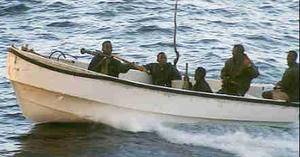Hi-tech navies protect shipping from Somalia's pirates
The six ship EU force and other Western-led forces patrolling the Gulf of Aden have disrupted fifty-nine pirate groups in April and May alone; some naval forces in the region concentrate on escorting convoys of their own national vessels, while the Western-led forces spread themselves across the region saying they want to protect all shipping regardless of flag

Skiff of Somali pirates with rocket-propelled grenade launcher and small arms // Source: scrapetv.com
How do you tell the difference between a Somali pirate in a small boat and a largely identical but innocent fisherman? It all comes down to the ladders. Pirates often take fishing gear out with them into the deep waters of the Indian Ocean to help feed themselves, and fishermen from the lawless country often carry AK-47s for self protection. Grappling hooks can be easily hidden out of sight. If naval officers see a small boat with long metal ladders lashed to the deck, however, they say they know for sure the occupants have set to sea with only one thing in mind.
The Global Post reports that this means maritime patrol aircraft and helicopters flying along the Somali beach can pick out pick out so-called “pirate action groups” putting to sea and feed the information back to warship and command center operations rooms.
“You can see the giveaway signs that this is a pirate gathering,” says Andreas Kutsch, a German naval officer working as an assistant chief of staff for the EU’s anti-piracy task force, using a laser pointer to show the ladders among the brightly colored plastic containers for spare fuel and water. “Fishermen don’t need ladders.”
Boarding merchant vessels, sailing them to the Somali coast, and holding them and their crews ransom, the pirates have redrawn shipping lanes across the Indian Ocean. They have infuriated owners and insurers and prompted a surge of naval forces to the region.
On any given day, the United States estimates that some 30 to 40 warships are involved in counter piracy efforts from the EU, NATO, and the United States as well as emerging Indian Ocean players China, Russia, India, Malaysia, South Korea, and Japan.
The latter tend to concentrate on escorting convoys of their own national vessels, while the Western-led forces spread themselves across the region saying they want to protect all shipping regardless of flag.
There is no overall commander although the navies meet once a month in Bahrain and coordinate through an Internet chat room.
Poverty, rewards drive piracy
At the British base northwest of London that houses the headquarters of both the EU and NATO forces, dozens of personnel coordinate and monitor shipping a quarter of a world away.
Two merchant navy liaison officers — tanker, cruise ship and freighter captains on loan from their companies — communicate with ships by email and phone, pointing them toward convoys and the safest routes.
The military
